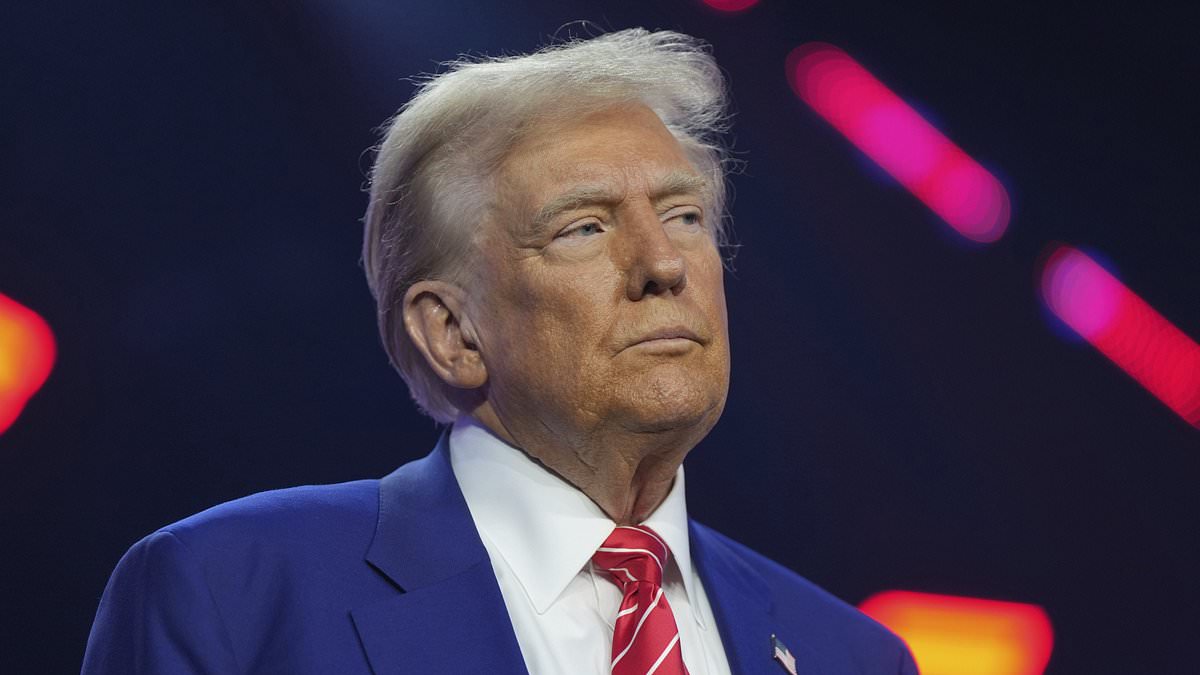Donald Trump gave a sneak peak of the massive bill he wants to launch right out of the gate once he is sworn into office in two weeks.
But his ambitious goal could face an uphill climb in a deeply divided Congress as Republicans hold slim majorities in both chambers.
The 78-year-old president-elect teased in a social media post that he wants the legislation to fold in a series of his priorities including border security and extending the tax cuts he introduced back in 2017.
‘We must Secure our Border, Unleash American Energy, and Renew the Trump Tax Cuts, which were the largest in History, but we will make it even better,’ he wrote.
‘NO TAX ON TIPS. IT WILL ALL BE MADE UP WITH TARIFFS, AND MUCH MORE, FROM COUNTRIES THAT HAVE TAKEN ADVANTAGE OF THE U.S. FOR YEARS,’ he continued.
The ‘no tax on tips’ provision was a promise he made on the campaign trail.
The president-elect will begin his second term in the White House on January 20 after the GOP-controlled 119th Congress convened on Friday.
But Republicans have very little margin for error in their rowdy conference as they set out to achieve Trump’s agenda.
They hold just a three-seat majority in the Senate and will temporarily have an almost non-existent majority in the House once the president-elect takes office.
‘Republicans must unite, and quickly deliver these Historic Victories for the American People. Get smart, tough, and send the Bill to my desk to sign as soon as possible,’ Trump wrote on Truth Social.
Trump and GOP leaders want to pass their legislation by using the wonky so-called budget reconciliation process.
It would allow them to pass a bill with a simple majorities in both chambers and avoid the usual 60 votes necessary in the Senate to avoid a filibuster.
But some GOP lawmakers also see a lone massive bill as Republicans’ best chance to pass priorities with such a slim margin in the House.
A first glimpse of just how challenging it will be for the GOP to overcome infighting was exhibited on Friday with the reelection of House Speaker Mike Johnson.
He could only afford to lose one vote and be elected speaker as Democrats remained united in opposition. Two Republican lawmakers had to flip their votes to secure his victory after initially voting against him.
Republicans had been considering two separate budget reconciliation bills last month after securing victories in both chambers.
Conservative Republicans let by the chair of the House Freedom Caucus sent a letter in mid-December to GOP congressional leadership demanding that the first priority be a reconciliation bill that focuses on border security.
They argued the second reconciliation bill should focus on addressing the expiring tax cuts from the tax law passed under President Trump in 2017. Multiple provisions from that law are set to expire at the start of 2026.
But some Republicans in recent weeks have raised issue with the idea of pulling off two separate gigantic bills in one year.
While Trump said he wants one massive bill, he did leave the door open for two bills on Monday.
‘While I favor one bill, I also want to get everything passed, and you know, there are some people that don’t necessarily agree with it,’ Trump told conservative radio talk show host Hugh Hewitt.
House Republicans gathered in Maryland on Saturday morning to discuss their path forward and jumpstart efforts where Johnson indicated Trump’s preference for one piece of legislation.
Johnson over the weekend also laid out the expected timeline. He said they aim to move forward with the reconciliation process in early February, but the entire effort could take several months.
Some GOP lawmakers have signaled that the passage of any government spending must be offset by other spending cuts as the U.S. faces a ballooning national debt.
The fight among Republicans in Congress could easily boil down to what exactly they are willing to give up in order to enact their agenda if they can even reach offsets some are likely to demand.
Throwing a wrench in the entire process is the mounting pressure Congress faces to raise the debt limit to avoid the government defaulting on its bills.
While Republicans raised the debt limit three times during Trump’s first term, some conservative lawmakers have signaled they are unwilling to support GOP action on the debt limit unless there are deep spending cuts.
Trump’s post on using tariffs to pay for ending taxes on tips could also lead to intraparty strife.
During the campaign season, some Senate Republicans including the new Senate Majority Leader John Thune balked over Trump’s widespread plan to enact tariffs.
They warned of retaliatory tariffs, which could be slapped on American products in response, as economists also signal the cost of tariffs would be passed down to American consumers.
Using reconciliation to pass legislation has been used with some regularity in recent years as political divisions have eroded bipartisanship in Congress.
President Biden and Democrats used the budget reconciliation process to pass the American Rescue Plan in 2021 and the Inflation Reduction Act in 2022.
However, when they tried to include immigration reform provisions to include a legal path for residency for millions of immigrants in the reconciliation process, the effort was rejected by the Senate parliamentarian, the nonpartisan arbiter of Senate rules, in late 2021.
